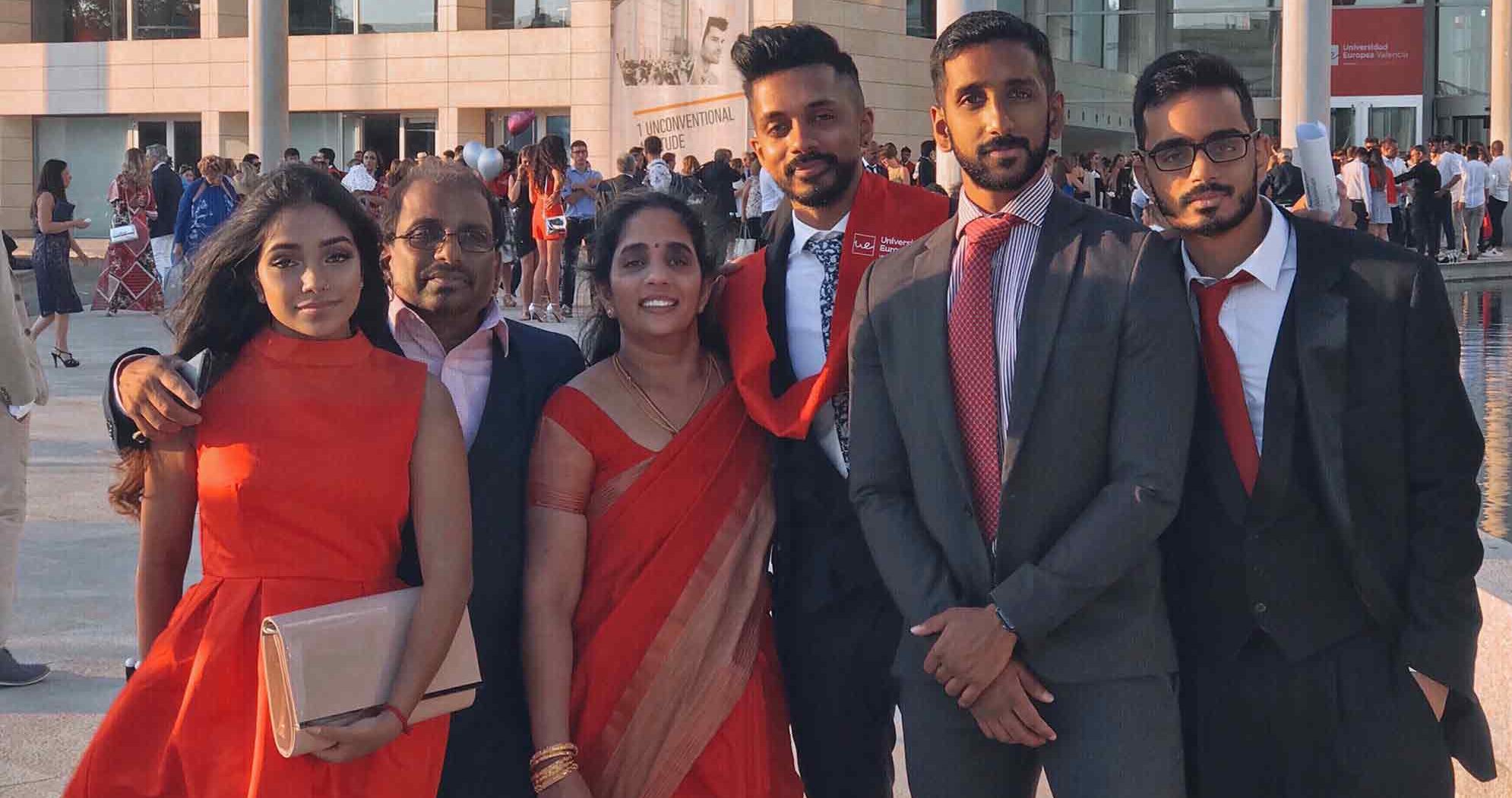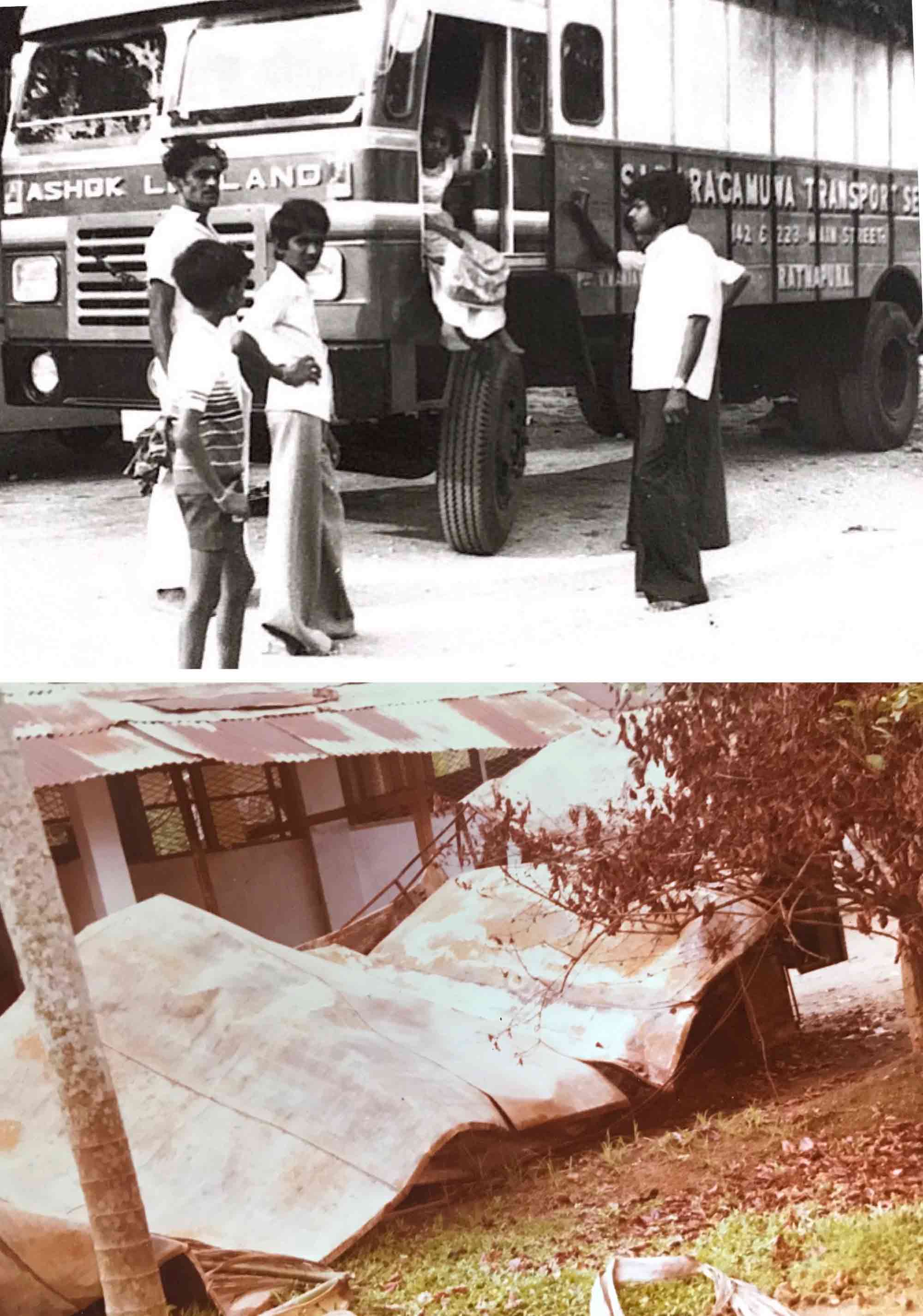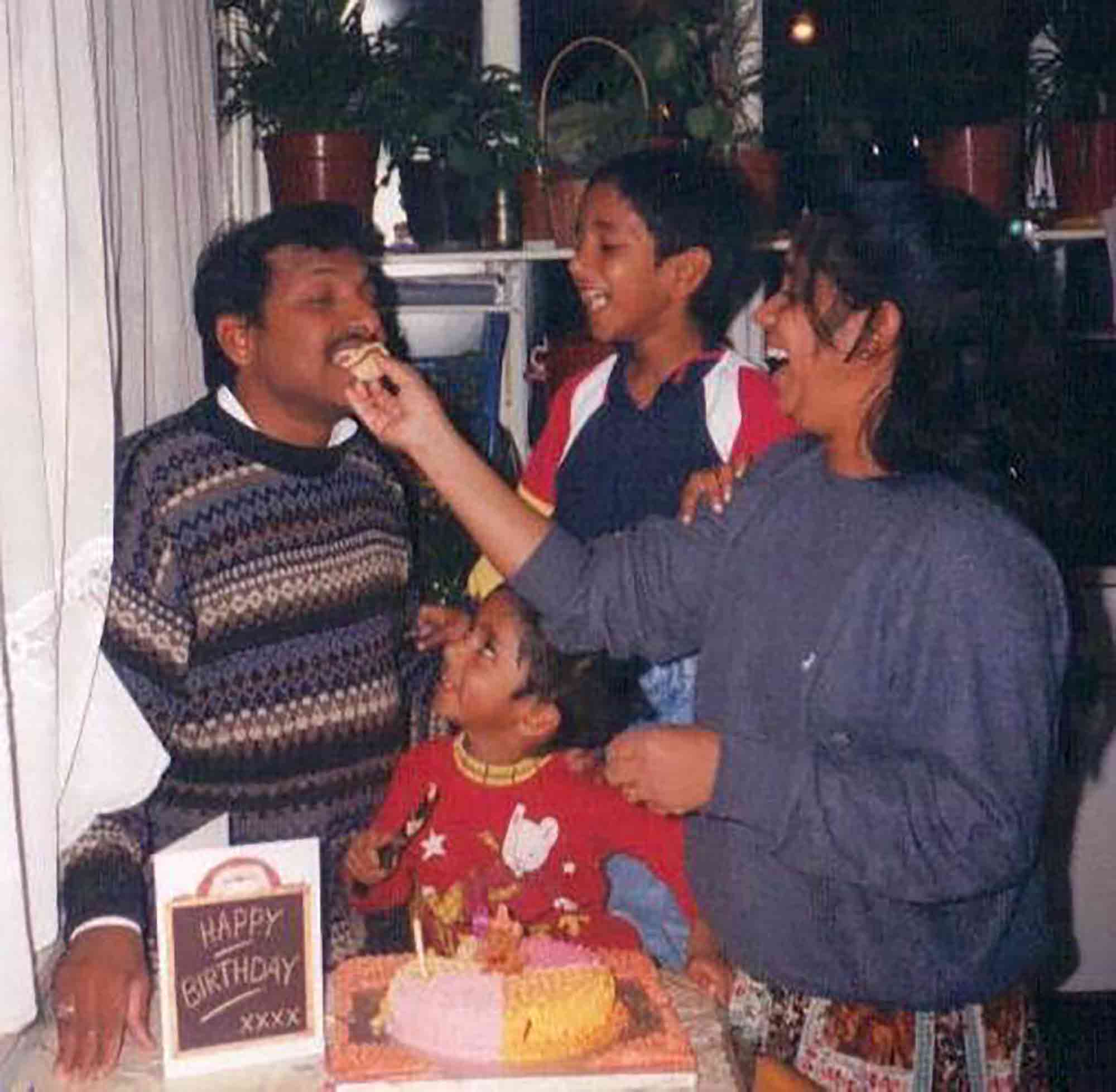 Jana Denzel talks about his childhood, his unique journey into dentistry and why failure is a part of success.
Jana Denzel talks about his childhood, his unique journey into dentistry and why failure is a part of success.
Tell us a bit about your family’s background
My parents are from a little island off the northern coast of Jaffna, in northern Sri Lanka, called Pungudutivu. My mother was born and raised in a very basic home (a mud-hut) with her two sisters and five brothers. However, my father was born in a slightly wealthier family, and grew up with three sisters and three brothers.
His father – my grandfather – had a few stores across the island that my father, being the eldest son, was running. He did not go to university. His role was to run the family business and that was what he dedicated himself to. Business was thriving and they were doing quite well as a family, with my father even taking holidays abroad as business grew. However, ethnic tensions on the island grew between Tamils, which my family were and the Sinhalese-dominated Sri Lankan government.
In 1981, Sinhalese mobs attacked, burned, and looted Tamil-owned businesses and killed Tamils in the process. This was just one of a series of anti-Tamil riots and pogroms. That night, my father’s family business went up in smoke. Their shops had been burnt down to the ground and my father’s pride and joy – a truck which had his name painted on the side – was left in ashes.
Luckily no one was in the shops when this took place. However, it wasn’t the case for many other Tamil businesses, where Tamils were killed. My dad went to the police to file a case about what happened, they didn’t care. He received a huge amount of racial abuse and day by day, more and more Tamils were getting killed on the island.
Starting from scratch
He realised that as a Tamil it was no longer safe for him and his family to stay in Sri Lanka. One by one, my father’s family all migrated and sought asylum in several places such as Toronto, Canada and London, UK.
My father had a tricky journey to London. He spent some years in Paris. Being homeless he slept in temples, working menial jobs with other asylum seekers from around the world, including many Tamils. There too, immigrant communities faced poverty and violence, with my father losing more friends to murders. Eventually, he managed to make it to London.
My mother also faced similar hardship. The war was raging and not only was there a lack of opportunity, it was also becoming dangerous to stay on the island. Luckily her older brother got a scholarship to study in London. As he was there, he was able to sponsor and fly his family (including my mother) into London. They were safe there.
My parents met and married in London but both of them started with very little. Neither of my parents had the opportunity to go to university or into higher education. They were forced to flee their homes to a strange new place where they didn’t know the language or the culture. They literally started from scratch.

How would you describe your childhood?
When they had my older brother and me, we were all sleeping in one room in a house in London. All the other rooms were rented out to other Tamil refugees. We would have so many people packed into these rooms. I vividly remember some days, we had six men all sleeping in one double room. It was pretty crazy looking back on it, with each person having their own horrifying story to tell. But when I was there as a kid I loved being surrounded by so many people.
My parents did not work in professional jobs – and they still don’t. But they worked hard, sometimes multiple jobs at once. As they did not have the opportunities to attend university, they would always make sure that we knew the value of education.
They had my older brother, then me and then my younger brother too. My parents worked hard for years, saving more money and instilling that sense of education in us. We eventually ended up moving house, where they had my younger sister.
Role models
My father worked in many jobs – anything and anywhere people would give him a job or a chance he took it. He’s now been with Royal Mail for over 20 years. My mother also worked and continues to work in Sainsbury’s for as long as I can remember.
I’m the second of four kids and my parents worked so hard to provide for us, working up to 16 hours a day and really raising us well. In everything from academics to morals and ethics, they gave their entire lives to raising and supporting us – despite not having much. My older brother, Thusiyan, is a great role model. He works as a doctor, but also a renowned political activist. He’s dedicated his life into helping others and to live up to that since a young age was hard.
Unfortunately during my teenage years, I took a different route. Although having the morals and ethics my parents raised me with, I was influenced by things I did not have growing up. Seeing people in my area with money, designer clothes and flashy cars steered me a little off track. I started associating with the wrong crowd and this really pushed my parents’ patience.
When did you decide to make changes to your life?
When I was 19 my parents got fed up and in true ‘Fresh Prince of Bel-air’ style sent me to go live with my aunty for a while. It took me a while to adjust as it was an environment and schedule I wasn’t used to before.
For example, having a set time to wake up, work, have my meals, and go to bed. However, it really gave me a chance to turn my life around and for that I will always be grateful to my uncle and aunty who took me in.
With that, and due to the help I received from so many people, I’m now career driven with clear goals that I’m really focused on to achieve. I feel everything I went through in life has actually played a role into making me a better dentist.
From the mistakes I made when I was younger, to being the dentist I am today – it’s clear that if you work hard, anyone can change their life around. And with this I feel we do need to engage with the youth more, because if I can make it why can’t they? There are glass ceilings that society can sometimes place and we all need to help to try to break them.
When and why did you start to show an interest in dentistry?
My journey into dentistry has been a long, long road. When I was 15, I visited Canada as my dad’s brother had passed away. He was very close to us and had lived with us previously. It was a tragic time for us all. Whilst here and still discovering myself and what his passing meant, I got the opportunity to visit another uncle’s dental clinics.
I instantly fell in love with the profession. In the wake of what had happened I decided to put my head down and pursue this field further. From then, I came back to the UK and at 15, explored the field of dentistry even more. I had work experience in multiple dental clinics, orthodontics and even with the Royal Air Force.

You had an unusual entry into dentistry. How did you get yourself through dental school?
When the time came to apply to dentistry, I built up a solid application and I received my offers. However, on results day, I fell short of meeting my London offer by a grade. Though I had opportunities and better chances to study outside of the city, I was so comfortable with my bubble in London and I didn’t want to break away from it.
With taking a gap year, all universities requested four As to meet their offer, and although I received my offers from the universities, I ended up getting three As and a B. So again, I fell short.
I then decided to take a BSc and reapply. That didn’t work out and I was really stuck. So I decided to take the next year and work as a recruitment consultant in London – with the objective to raise money to fund myself to study dentistry abroad in Spain.
However, what I saved after the year was not nearly enough to fund the full course. Thankfully, my father really believed in me and was able to help fund me through my course.
Sacrifices
When I was in Valencia, I had a job the whole time. I worked in events, restaurants, clubs and retail. It wasn’t at all easy to balance that with my studies. I was really trying to strive academically as well. Within the first three years of my dental school, I was the student representative for my year. But in the final two years having to balance work with university, it was a little too much for me.
The day of my graduation was great. My whole family came out to Valencia for it. The moment I was on stage and they put the graduation robe around me, I turned around and saw my dad crying his eyes out. I pointed at my robe and then back at him, because none of it would have ever been possible without him. My dental graduation day wasn’t about me – it was about my family.
The sacrifices they made for me just to give me the opportunity to fulfil my dream is something I will always be grateful for. From remortgaging the house to raising money through all the late nights they worked. I know anything I do in my lifetime will never be as hard as what they went through. And no matter how much I spend my life giving back to them, what they did for me will always be way more. My family is the reason why I’m a dentist today.
What are some of the most important lessons you’ve taken away from your experiences?
It’s the story. We are all writing a book of our own lives. What does your book look like? At the end of the book you need to look back and see all the things that can be associated with you and your existence. My drive is about my book.
I say to myself if my mother can come from a mud-hut, in a war-torn country to living in a house in London with four successful children, then what is stopping me from achieving my dreams? What’s stopping you from achieving yours? We all are great. There is no reason for you to think that you’re not great or the highest of yourself.
Know every failure is one step closer to success. There are so many people who would have given up with pursuing dentistry if they applied and didn’t get in the first time. For me, it took me three attempts until I got in. I didn’t quit. I didn’t fall back. So if you’re truly passionate about something, don’t quit.
Be an example
All the hardships and mistakes I’ve made in my life have made me into the person I am today, so I wouldn’t change any of it.
Being turned down from dentistry initially allowed me to study biology with psychology, and then spend a year after working in the city as a recruitment consultant. It hugely improved my interpersonal, communication, leadership and management skills. All these skills make me a much better holistic clinician than I would have been if I just initially studied dentistry and started practising.
The person I am today is a much more developed person than I was yesterday. I want to continue to develop and improve. I want to be an example for people to see where I was in life before and where I am now. If I can do it, there’s no reason why no one else can’t achieve their goals.
What would your advice be for other young or aspiring dentists?
If you give up at the first sign of struggle or failure, then you’re really not ready to be successful. I’ve only succeeded becoming a dentist because I didn’t stop at the first sign of failure. That and because a lot of blood, sweat and tears have gone into this career of mine. And not just from me, but from all those who supported me.
Ensure you stay loyal to those who help you grow. If they bought into your dream, it means they believed in you. That means they invested in you (whether that be time, money, energy and effort). In return, you have to invest into your vision and promise them that when you win, you win it all together and give back. Practise gratitude – that’s my advice for young or aspiring dentists.


